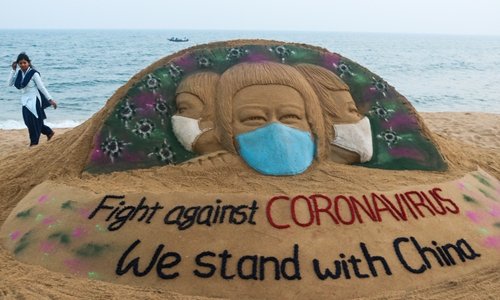HOME >> OPINION
US exploiting of coronavirus crisis unworthy of a great power
Source:Global Times Published: 2020/2/11 20:52:14

A woman on Monday walks past a sand sculpture depicting people wearing protective face masks with a message reading "Fight against coronavirus, We stand with China" made by Indian artist Sudarsan Pattnaik at Puri beach in Puri. The number of fatalities. Photo: AFP
Since the outbreak of the novel coronavirus epidemic in China, people have wondered if the US, the world's superpower, has provided substantial assistance to China, and just how much aid it has offered.
Although US President Donald Trump on February 2 said the US has offered help to China to combat the spread of the novel coronavirus pneumonia (NCP), Chinese Foreign Ministry Spokesperson Hua Chunying on February 3 said, "The US government hasn't provided any substantive assistance to us." US Secretary of State Mike Pompeo on Friday announced that the US would spend up to $100 million to help China and other countries affected by the NCP. How to interpret the US move?
In the face of the novel coronavirus outbreak, the response from US government diverges from US public perception. People in the US, especially Chinese Americans, have contributed to China's battle against the coronavirus, while the response from the US administration has been controversial and widely considered immoral by many Chinese.
The US administration has been reluctant to offer any pragmatic aid to China, and instead has taken several negative measures. Just as Hua said on February 3, the US was the first to evacuate personnel from its consulate in Wuhan, the first to suggest partial withdrawal of its embassy staff, and the first to impose a travel ban on foreigners arriving from China. "What it has done could only create and spread fear, which is a very bad example," said Hua.
On the one hand, US officials regard the outbreak of the novel coronavirus from the perspective of geopolitics, harboring the mind-set of schadenfreude, in which they take pleasure in other people's misfortune. Washington may think the epidemic would slow the pace of China's development, realizing US' goals as it engages in a strategic competition with China.
On the other hand, the US has long had a deep-seated prejudice against China's system of governance. It has used the epidemic as an opportunity to unfairly blame the Chinese system of failing to effectively prevent and control the NCP during the initial outbreak.
The US government's indifference toward the outbreak triggered criticism from the Chinese foreign ministry and many Chinese people. Pompeo's announcement on the donation of $100 million was made after the criticism. Yet the Chinese government and public have been fully aware of the stance of US government.
So far, Washington has not announced how it will distribute the $100 million in aid. The recipients will not only include China, but other countries impacted by the virus. It's still unknown what kind and how much assistance US might eventually provide China.
Since the outbreak of the epidemic, the anti-China rhetoric spewed by US politicians and elites have only added insult to injury. For example, Reuters reported Pompeo on Saturday urged governors of US states and territories to adopt a "cautious mind-set" toward doing business with China, claiming it was attempting to take advantage of US openness to undermine the superpower. US Republican Senator Tom Cotton smeared the Communist Party of China by suggesting the virus could be a man-made bioweapon that leaked from the world-class Wuhan Institute of Virology.
To some extent, US' moves and words on the outbreak show Washington is using it as an opportunity in its competition with Beijing, which is inconsistent with the image of a responsible great power.
Since the 2016 presidential campaign, Trump has been cranking up his "America First" doctrine. It has earned the country the image of being selfish and self-serving, one that only takes into account of its own interests, regardless of the interests of other countries. Under "America First," Washington has not acted as a responsible great power as it had under Barack Obama or even George W. Bush.
The article was compiled by Global Times reporter Lu Yuanzhi based on an interview with Wu Shuang, a professor of international relations based in Shanghai. opinion@globaltimes.com.cn
RELATED ARTICLES:
Posted in: VIEWPOINT